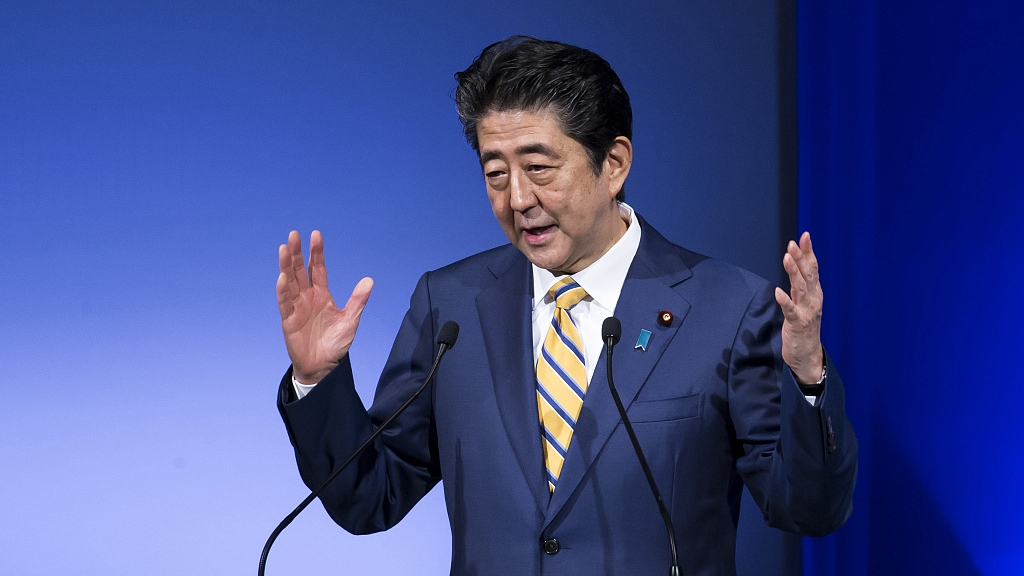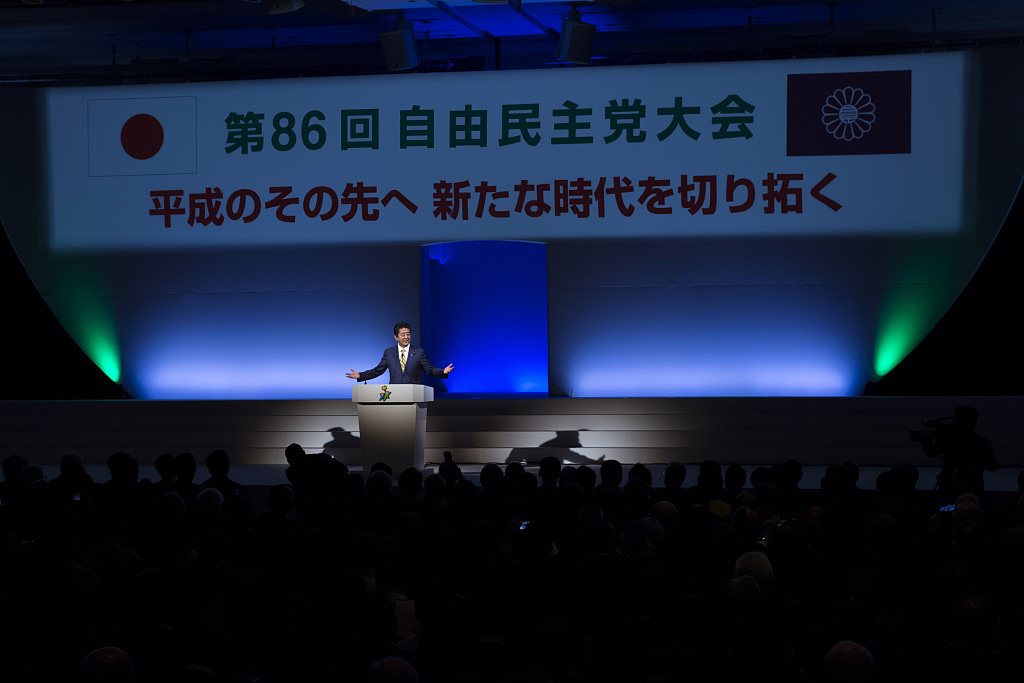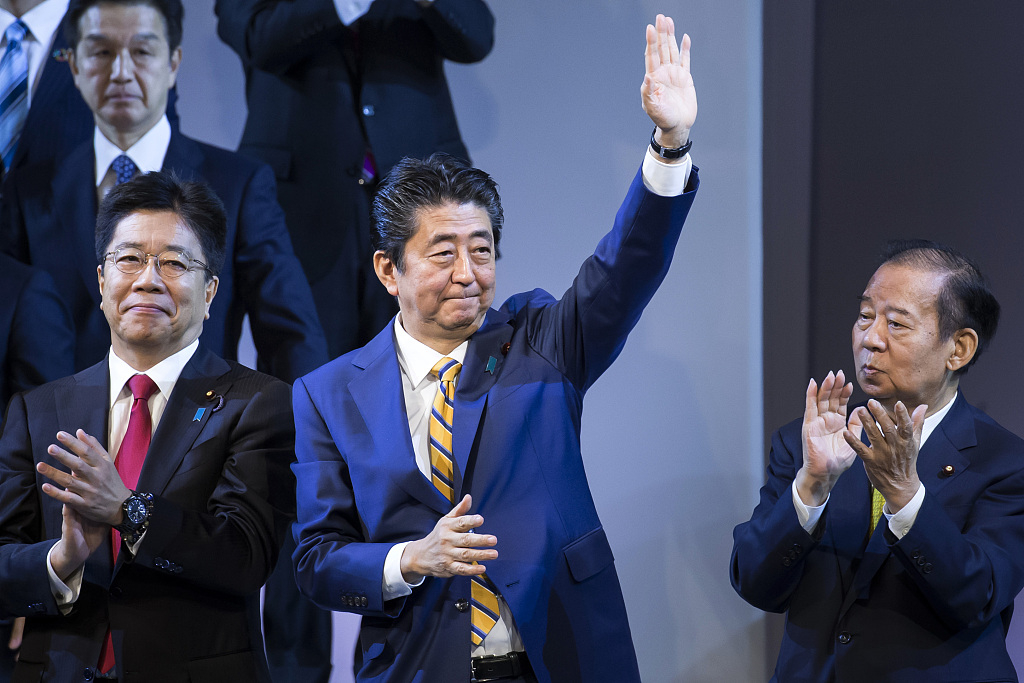
Opinion
10:36, 21-May-2019
Is Abe edging towards calling a double election?
Chris Deacon

Editor's Note: Chris Deacon is a postgraduate researcher in politics and international relations at the University of London and previously worked as an international commercial lawyer. The article reflects the author's opinion, and not necessarily the views of CGTN.
Speculation is rising that Japanese Prime Minister Shinzo Abe may dissolve the Lower House of the Japanese Diet in order who hold a general election alongside the Upper House elections already due this summer.
By-election defeats for his governing Liberal Democratic Party (LDP) last month, and low approval ratings more generally, had suggested that Abe might shy away from the move. However, a poll boost at the start of the new Reiwa era could give Abe the impetus to change his mind.
The Japanese government's approval rating has recently shot up to its highest level this year, likely helped by a general uptick in public sentiment resulting from the celebrations for the crowning of the new emperor and the accompanying long holiday period.
There are also strategic reasons why such a move could be a good idea for Abe. The last time these Upper House seats were up for election was in 2013, when the LDP performed very well. It is expected, therefore, that some of these seats might be lost as it will be difficult for the LDP to sustain this level of performance.
In an attempt to overcome this likelihood, many in the LDP expect that if a "double election" were held, the mobilization of its Lower House electoral apparatus would boost performance in the Upper House poll.
While the Lower House is generally the focus of Japanese political discussion, the make-up of the Upper House will be important for any attempts by Abe to revise the Japanese constitution, as he has repeatedly promised to do. Such revisions require a two-thirds majority of both the Lower and Upper House, followed by a public referendum (in which only a simple majority if required).

Japanese Prime Minister and Liberal Democratic Party (LDP) President Shinzo Abe delivers a speech at the party's annual convention in Tokyo, Japan, February 10, 2019. /VCG Photo
Japanese Prime Minister and Liberal Democratic Party (LDP) President Shinzo Abe delivers a speech at the party's annual convention in Tokyo, Japan, February 10, 2019. /VCG Photo
Boosting pro-revision numbers in the Upper House is therefore of major importance to Abe and explains why doing well in the elections this summer is a high priority for him, if he does intend to eventually pursue his long-held ambition of constitutional reform.
Abe may also have calculated that he can capitalize on the international political environment to boost his popularity in these elections. He has recently signaled a major shift in policy regarding the Democratic People's Republic of Korea (DPRK) by offering to meet with Kim Jong Un with no preconditions. Any meeting could well result in a domestic poll boost.
Combined with this, U.S. President Donald Trump will also be visiting Japan later this week as the first foreign leader to receive a formal state visit in the new Reiwa era. Japan will then host the G20 Summit in Osaka in late June. All of this will position the Japanese prime minister as a globally-respected statesman and may well boost his electoral results.
But calling a "double election" is also a risky tactic. While Japanese opposition parties have been in disarray for some time – unable to mount a serious challenge to the LDP – there are moves to form an alliance ahead of this summer's elections.
The Constitutional Democratic Party of Japan (CDPJ) has held talks with other opposition parties to agree to field a single opposition candidate in future Upper and Lower House elections in order to pose a more serious challenge to the LDP.
The Japanese Community Party – often criticized for preventing opposition victories by fielding candidates who draw votes away from the primary challenging opposition party of the day – has also moved to relax some of its rules for supporting a unity opposition candidate.

Shinzo Abe (C) attends the party's annual convention in Tokyo, Japan, February 10, 2019. /VCG Photo
Shinzo Abe (C) attends the party's annual convention in Tokyo, Japan, February 10, 2019. /VCG Photo
Even the LDP's coalition partner, Komeito, has voiced concerns about dissolving the Lower House this summer, fearing that any loss of support could irreparably damage the current administration.
Holding a double election this summer, therefore, would be a major gamble for Abe. Many will question whether the potential upsides of boosting support in the Upper House are enough to offset the risks of harming the administration, even if the LDP does not lose power.
Abe himself, with a maximum of only another two years as prime minister due to his own party's leadership rules, is acutely aware of building a personal legacy at this time. A poor performance in polls this summer could put pressure on him to resign early, which would be far from his desired outcome.
There is still clearly a great deal he wishes to accomplish, particularly in the foreign policy realm. During his premiership, however, he has not shied away from calling early elections when he felt the time was right. He may well deem the celebratory mood in Japan greeting the new Reiwa era to be enough reason to go to the polls once again.
(If you want to contribute and have specific expertise, please contact us at opinions@cgtn.com.)

SITEMAP
Copyright © 2018 CGTN. Beijing ICP prepared NO.16065310-3
Copyright © 2018 CGTN. Beijing ICP prepared NO.16065310-3